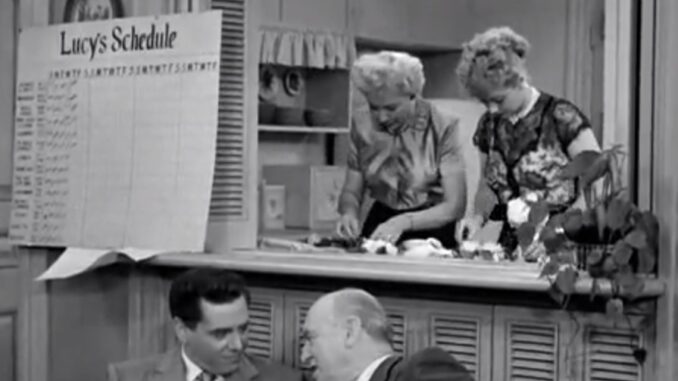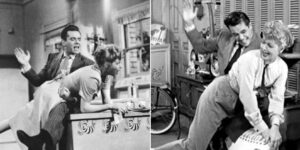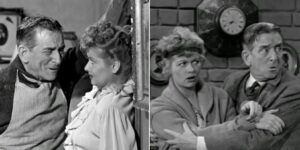
Introduction: A Beloved Classic with a Few Wrinkles
“I Love Lucy” is one of television’s most cherished shows. Its timeless humor, lovable characters, and groundbreaking storytelling earned it a permanent spot in pop culture history. However, like many products of its time, some jokes and storylines now feel outdated, reflecting societal norms that have evolved significantly since the 1950s.
While the show remains a treasure, let’s take a closer look at 10 jokes from “I Love Lucy” that haven’t aged well and why they feel so off by today’s standards.
What Made “I Love Lucy” a Cultural Phenomenon?
Before diving into specific jokes, it’s worth understanding why the series became a benchmark for comedy.
- Lucille Ball’s Genius: Her slapstick skills, impeccable timing, and charm captivated audiences.
- Groundbreaking Premise: A show about a strong, funny woman eager to break into showbiz.
- Cultural Firsts: The first interracial marriage shown on TV, starring Lucille Ball and real-life husband Desi Arnaz.
But with all its innovation came jokes that, while funny then, clash with modern sensibilities.
1. Gender Roles Played for Laughs
One recurring gag throughout the series revolves around the rigid gender roles of the 1950s. Lucy’s attempts to work or step outside traditional “women’s duties” often end in chaos, suggesting that women “belong” at home.

- Example: Lucy’s failed attempts at jobs (like working at the chocolate factory) are hilarious but reinforce the stereotype that women shouldn’t work outside the house.
- Why It Aged Poorly: Today’s viewers see this as perpetuating the idea that women are inept outside domestic roles.
2. Ethnic Stereotypes About Ricky
While Desi Arnaz’s portrayal of Ricky Ricardo was groundbreaking, the show sometimes leaned into ethnic stereotypes for laughs.
- Example: Ricky’s accent was often exaggerated or mocked, especially when he got angry.
- Why It Aged Poorly: What was once playful banter now feels disrespectful and dismissive of cultural diversity.
3. Jokes About Domestic Discipline
Lucy and Ricky’s dynamic occasionally veered into jokes about controlling or disciplining one’s spouse.
- Example: Ricky threatening to “spank” Lucy for misbehaving.
- Why It Aged Poorly: What was framed as playful humor now raises eyebrows due to modern views on respect and equality in relationships.
4. Body-Shaming Humor
Some jokes focused on Lucy’s appearance, often in ways that wouldn’t sit well with today’s audiences.
- Example: Comments about Lucy needing to lose weight or comparing her to slimmer women for comedic effect.
- Why It Aged Poorly: Body positivity movements have made such humor feel outdated and harmful.
5. The Infantilization of Women
Lucy’s “childlike” antics were a central theme, often portraying her as naïve or incapable of making adult decisions.
- Example: Lucy hiding purchases from Ricky like a child hiding bad grades from a parent.
- Why It Aged Poorly: Today, this dynamic undermines the concept of mutual respect in partnerships.
6. Dismissal of Mental Health
In several episodes, jokes about Lucy’s “craziness” were used as a punchline.
- Example: Ricky referring to Lucy as a “nut” or joking about her needing a psychiatrist.
- Why It Aged Poorly: Modern views emphasize understanding mental health rather than using it as a comedic trope.
7. Racial Insensitivity in Guest Characters
Some episodes included portrayals of minority characters that played into stereotypes.
- Example: Asian or Latino characters with exaggerated accents or subservient roles.
- Why It Aged Poorly: These portrayals now appear as caricatures rather than authentic representations.
8. “Battle of the Sexes” Humor
The constant jokes about men being smarter, more logical, or better suited for leadership than women were prevalent.
- Example: Ricky’s frequent dismissal of Lucy’s ideas, often stating that women can’t handle complex things.
- Why It Aged Poorly: These tropes perpetuate harmful gender stereotypes and inequality.
9. Financial Dependence as a Joke
Lucy’s reliance on Ricky for money was a running gag, with jokes about her inability to handle finances.
- Example: Lucy sneaking around to buy dresses or hiding expenses from Ricky.
- Why It Aged Poorly: This reinforces outdated ideas about women being financially dependent on men.
10. Laughing at Lucy’s Dreams
Lucy’s desire to break into show business was treated as a running joke, with little encouragement from those around her.
- Example: Ricky and others often belittling her aspirations as foolish or childish.
- Why It Aged Poorly: Today, this attitude feels dismissive of women pursuing their dreams.
Why It’s Important to Revisit These Jokes
Reflecting on these jokes isn’t about canceling “I Love Lucy.” Instead, it’s a chance to appreciate how far society has come while acknowledging the show as a product of its time. Comedy evolves, and the humor that resonated in one era may clash with the values of another.

What Made “I Love Lucy” Timeless Despite Its Flaws?
- Lucille Ball’s Trailblazing Spirit: Her comedic genius continues to inspire.
- Universal Themes: Friendship, ambition, and love transcend time.
- Lessons on Growth: Recognizing and addressing past missteps helps us appreciate progress.
Conclusion
“I Love Lucy” remains a beloved masterpiece, but like any cultural artifact, it carries the fingerprints of its time. By examining these 10 jokes that aged poorly, we see both the strides society has made and the importance of continuing to push for inclusivity and respect in comedy.
FAQs
1. Why is “I Love Lucy” still popular today?
Its relatable humor, endearing characters, and Lucille Ball’s brilliance make it timeless.
2. Did Lucille Ball face criticism for outdated jokes during her time?
No, the jokes reflected the norms of the 1950s and weren’t considered problematic then.
3. How has comedy evolved since the 1950s?
Comedy now focuses more on inclusivity, avoiding stereotypes and embracing diverse perspectives.
4. Should we stop watching “I Love Lucy” because of outdated jokes?
Not at all! It’s important to appreciate it as a historical artifact while acknowledging its flaws.
5. Are modern sitcoms free of problematic humor?
Not entirely. Every era has its blind spots, but awareness helps create more thoughtful content.